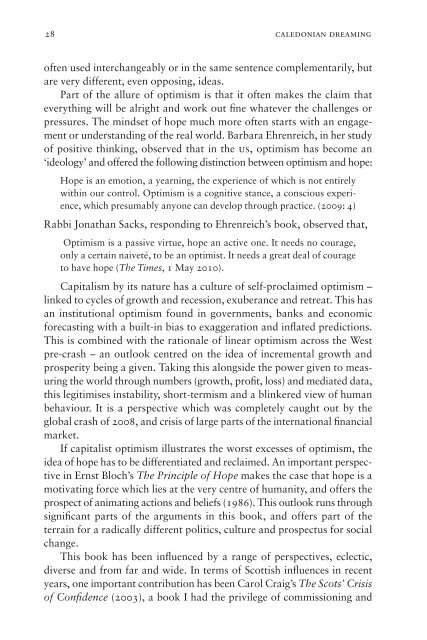Caledonian Dreaming by Gerry Hassan sampler
Caledonian Dreaming: The Quest for a Different Scotland offers a penetrating and original way forward for Scotland beyond the current independence debate. It identifies the myths of modern Scotland, describes what they say and why they need to be seen as myths. Hassan argues that Scotland is already changing, as traditional institutions and power decline and new forces emerge. He outlines a prospectus for Scotland to become more democratic and to embrace radical and far-reaching change.
Caledonian Dreaming: The Quest for a Different Scotland offers a penetrating and original way forward for Scotland beyond the current independence debate. It identifies the myths of modern Scotland, describes what they say and why they need to be seen as myths.
Hassan argues that Scotland is already changing, as traditional institutions and power decline and new forces emerge. He outlines a prospectus for Scotland to become more democratic and to embrace radical and far-reaching change.
You also want an ePaper? Increase the reach of your titles
YUMPU automatically turns print PDFs into web optimized ePapers that Google loves.
28 caledonian dreaming<br />
often used interchangeably or in the same sentence complementarily, but<br />
are very different, even opposing, ideas.<br />
Part of the allure of optimism is that it often makes the claim that<br />
everything will be alright and work out fine whatever the challenges or<br />
pressures. The mindset of hope much more often starts with an engagement<br />
or understanding of the real world. Barbara Ehrenreich, in her study<br />
of positive thinking, observed that in the us, optimism has become an<br />
‘ideology’ and offered the following distinction between optimism and hope:<br />
Hope is an emotion, a yearning, the experience of which is not entirely<br />
within our control. Optimism is a cognitive stance, a conscious experience,<br />
which presumably anyone can develop through practice. (2009: 4)<br />
Rabbi Jonathan Sacks, responding to Ehrenreich’s book, observed that,<br />
Optimism is a passive virtue, hope an active one. It needs no courage,<br />
only a certain naiveté, to be an optimist. It needs a great deal of courage<br />
to have hope (The Times, 1 May 2010).<br />
Capitalism <strong>by</strong> its nature has a culture of self-proclaimed optimism –<br />
linked to cycles of growth and recession, exuberance and retreat. This has<br />
an institutional optimism found in governments, banks and economic<br />
forecasting with a built-in bias to exaggeration and inflated predictions.<br />
This is combined with the rationale of linear optimism across the West<br />
pre-crash – an outlook centred on the idea of incremental growth and<br />
prosperity being a given. Taking this alongside the power given to measuring<br />
the world through numbers (growth, profit, loss) and mediated data,<br />
this legitimises instability, short-termism and a blinkered view of human<br />
behaviour. It is a perspective which was completely caught out <strong>by</strong> the<br />
global crash of 2008, and crisis of large parts of the international financial<br />
market.<br />
If capitalist optimism illustrates the worst excesses of optimism, the<br />
idea of hope has to be differentiated and reclaimed. An important perspective<br />
in Ernst Bloch’s The Principle of Hope makes the case that hope is a<br />
motivating force which lies at the very centre of humanity, and offers the<br />
prospect of animating actions and beliefs (1986). This outlook runs through<br />
significant parts of the arguments in this book, and offers part of the<br />
terrain for a radically different politics, culture and prospectus for social<br />
change.<br />
This book has been influenced <strong>by</strong> a range of perspectives, eclectic,<br />
diverse and from far and wide. In terms of Scottish influences in recent<br />
years, one important contribution has been Carol Craig’s The Scots’ Crisis<br />
of Confidence (2003), a book I had the privilege of commissioning and


















